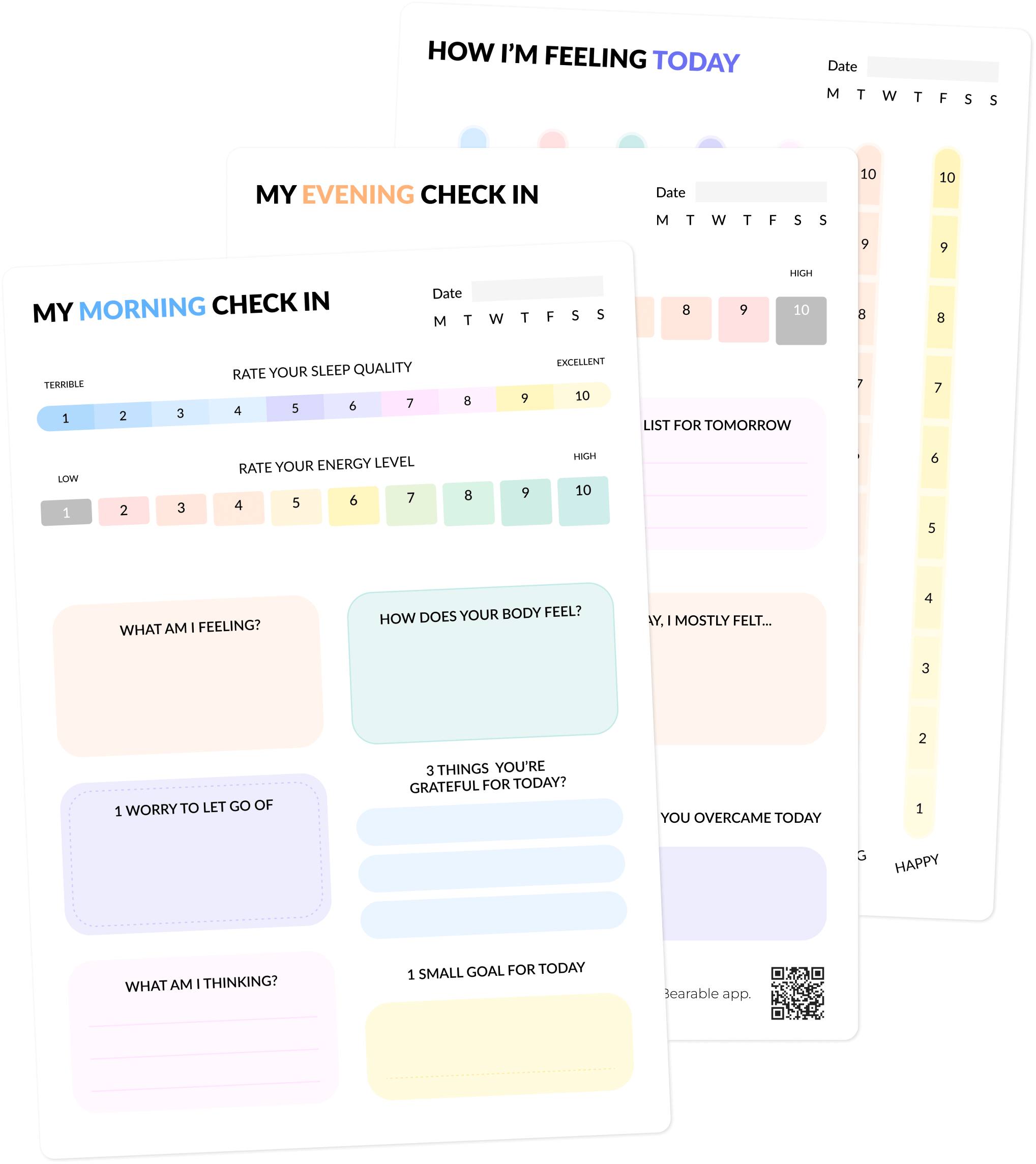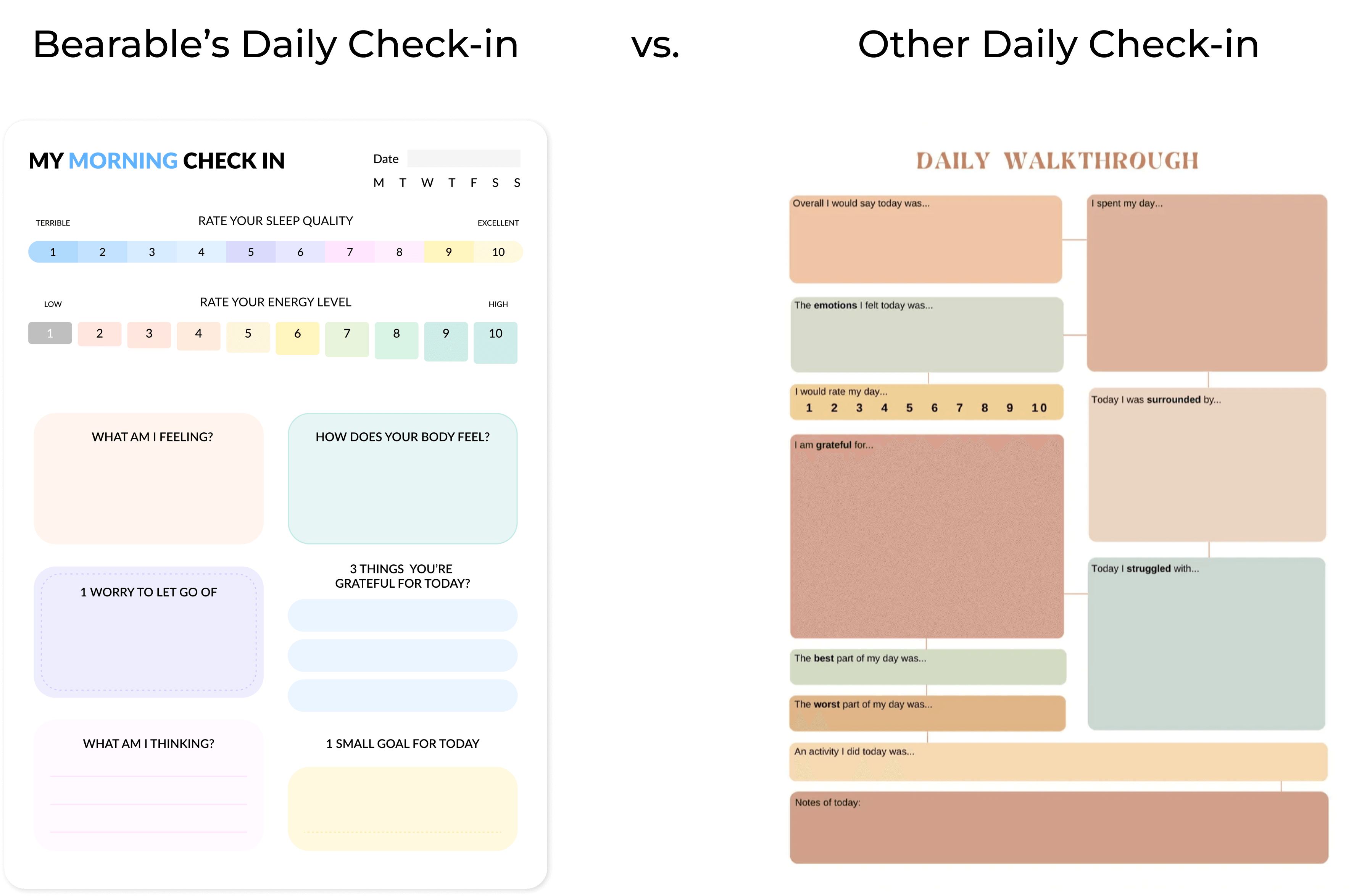
Managing your mental health can feel like an ongoing battle but a small step in winning that battle can be to take the time to check in with yourself every day. This might be to acknowledge your feelings, check your energy levels, let go of unhelpful thoughts or even give yourself credit for what you achieved today. You can use our mental health check in worksheet to self-manage your well-being or even share it with your medical team.

Sleep Quality & Energy Levels. These can have a huge impact on your mental capacity for the day ahead. Taking some time to reflect on them at the start of your day can help you to prevent overcommitment and overwhelm.
Your thoughts & feelings. When was the last time you actually stopped to ask yourself about how you’re feeling and how your body feels? Writing these things down gives you a chance to acknowledge and reflect on how these things might impact your day ahead.
Once you’ve been able to identify your feelings, it can also be helpful to track them. We’ve created a free Mood tracker worksheet (PDF) so that you can keep track of how you’re feeling, spot patterns, and manage your moods.
1. Identify triggers. There’s nothing wrong with experiencing a full spectrum of emotions. However, if you notice that there are periods when you’re especially scared, sad, or angry, it might help you to reflect on and identify the causes of these emotions.
2. Spot patterns. Having a record of your emotions can help you to identify patterns with other things in your life. Interactions with specific people, changes in hormones, or high-stress days. If you need help managing your emotions, having a record of them might also be helpful for your doctor or therapist.
3. Find more joy. Reflecting on your day can make it easier to identify the things that bring you joy. Whether it’s a good deed, spending time with your chosen family, or just playing your favourite game. Once you know what brings you joy, you can plan to do more of it.
Our daily mental health check-in worksheet can potentially offer several benefits, especially for individuals managing mental health conditions or simply aiming to improve their emotional well-being. Here are some of the key benefits:
💡 Self-Awareness.
Regularly reflecting on your mental state helps you become more in tune with your thoughts, feelings, and behaviors. This awareness allows you to recognize patterns, triggers, and emotional shifts.
😌 Emotional Regulation.
By identifying your emotions daily, you can better manage and regulate them. Over time, this leads to healthier coping strategies when faced with stress, anxiety, or other challenges.
📊 Tracking Progress.
A check-in worksheet provides a clear record of your mental health over time, making it easier to notice improvements or setbacks. This can be useful for setting goals and celebrating small victories.
⚠️ Early Detection of Issues.
By tracking your mood and mental health symptoms, you may notice patterns or warning signs of worsening mental health before it becomes overwhelming. This can help you take proactive steps to prevent further decline.
☎️ Improved Communication.
A daily check-in can help you organize your thoughts, which can be useful when discussing your mental health with a therapist, loved one, or healthcare provider.
🧘♀️ Reduced Anxiety and Stress.
Writing down your thoughts and feelings can provide an outlet for emotions that might otherwise build up. This can reduce the emotional load you’re carrying and give a sense of release or clarity.
📅 Building Healthy Habits.
A daily check-in encourages routine self-reflection, which can help you incorporate other healthy habits, such as practising gratitude, mindfulness, or setting intentions for the day.
♻️ Accountability and Structure.
Having a daily routine that includes a mental health check-in can provide structure, which is especially beneficial for those who may struggle with motivation or staying on track with mental health goals.
🪴 Personal Growth.
Regularly documenting your emotional state fosters personal growth. It helps you reflect on past experiences, identify areas for improvement, and recognize recurring themes that might need attention.
What’s unique about our daily check-in worksheet? We’re glad you asked. We created our own mental health worksheet because we’d struggled to use the other ones available online. Our worksheet aims to make it easier to:
That said, we’re still looking into ways to further improve our mental health worksheets by including useful prompts. If you have any suggestions let us know by contacting jesse@bearable.app

If the download doesn’t happen automatically, you can follow the instructions below:
1. Click the download button at the top of this page.
2. You’ll be redirected to a folder on Google Drive.
3. Click on the ‘Download the Daily Check-in Worksheet’ folder.
4. Then tap the download arrow in the top-right-hand corner of the screen.
5. Once you’ve downloaded the file, double-click it to unzip the folder and view your PDF worksheet templates.
Note. If you’re on a mobile device, you might need to use an app to open the .zip folder after you download it.
Because Bearable is a company founded at operated by people with chronic health conditions for people with chronic health conditions. AND even though our app is the number one symptom tracker in the USA and UK (that you can also use for free). We try to create as many free resources as possible for people who need some help managing their health.
You can check out some of our other free resources using the links below.
We couldn’t do this without you. So if you have an idea for a helpful free resource, let us know by getting in touch with jesse@bearable.app